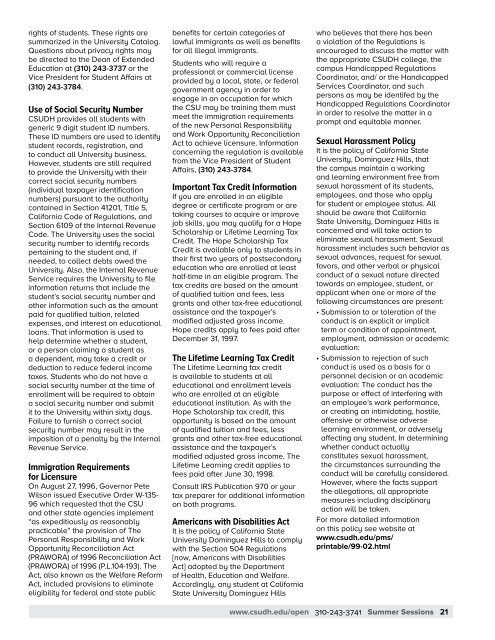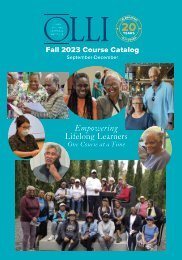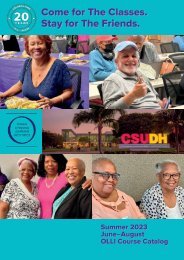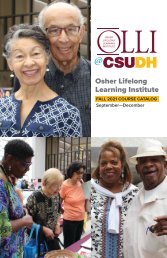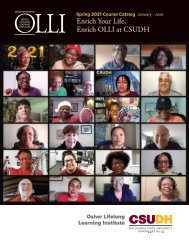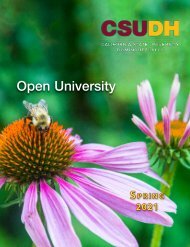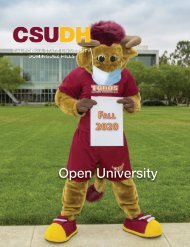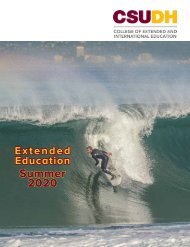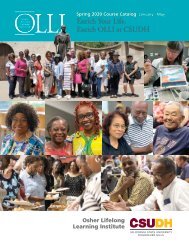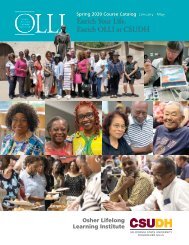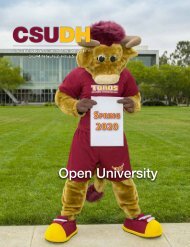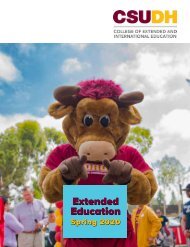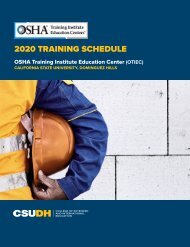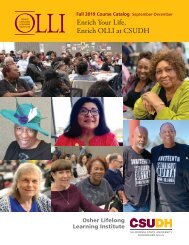CSUDH Summer Sessions 2020 Bulletin
CSUDH Summer Sessions 2020 Bulletin
CSUDH Summer Sessions 2020 Bulletin
You also want an ePaper? Increase the reach of your titles
YUMPU automatically turns print PDFs into web optimized ePapers that Google loves.
ights of students. These rights are<br />
summarized in the University Catalog.<br />
Questions about privacy rights may<br />
be directed to the Dean of Extended<br />
Education at (310) 243-3737 or the<br />
Vice President for Student Afairs at<br />
(310) 243-3784.<br />
Use of Social Security Number<br />
<strong>CSUDH</strong> provides all students with<br />
generic 9 digit student ID numbers.<br />
These ID numbers are used to identify<br />
student records, registration, and<br />
to conduct all University business.<br />
However, students are still required<br />
to provide the University with their<br />
correct social security numbers<br />
(individual taxpayer identifcation<br />
numbers) pursuant to the authority<br />
contained in Section 41201, Title 5,<br />
California Code of Regulations, and<br />
Section 6109 of the Internal Revenue<br />
Code. The University uses the social<br />
security number to identify records<br />
pertaining to the student and, if<br />
needed, to collect debts owed the<br />
University. Also, the Internal Revenue<br />
Service requires the University to fle<br />
information returns that include the<br />
student’s social security number and<br />
other information such as the amount<br />
paid for qualifed tuition, related<br />
expenses, and interest on educational<br />
loans. That information is used to<br />
help determine whether a student,<br />
or a person claiming a student as<br />
a dependent, may take a credit or<br />
deduction to reduce federal income<br />
taxes. Students who do not have a<br />
social security number at the time of<br />
enrollment will be required to obtain<br />
a social security number and submit<br />
it to the University within sixty days.<br />
Failure to furnish a correct social<br />
security number may result in the<br />
imposition of a penalty by the Internal<br />
Revenue Service.<br />
Immigration Requirements<br />
for Licensure<br />
On August 27, 1996, Governor Pete<br />
Wilson issued Executive Order W-135-<br />
96 which requested that the CSU<br />
and other state agencies implement<br />
“as expeditiously as reasonably<br />
practicable” the provision of The<br />
Personal Responsibility and Work<br />
Opportunity Reconciliation Act<br />
(PRAWORA) of 1996 Reconciliation Act<br />
(PRAWORA) of 1996 (P.L.104-193). The<br />
Act, also known as the Welfare Reform<br />
Act, included provisions to eliminate<br />
eligibility for federal and state public<br />
benefts for certain categories of<br />
lawful immigrants as well as benefts<br />
for all illegal immigrants.<br />
Students who will require a<br />
professional or commercial license<br />
provided by a local, state, or federal<br />
government agency in order to<br />
engage in an occupation for which<br />
the CSU may be training them must<br />
meet the immigration requirements<br />
of the new Personal Responsibility<br />
and Work Opportunity Reconciliation<br />
Act to achieve licensure. Information<br />
concerning the regulation is available<br />
from the Vice President of Student<br />
Afairs, (310) 243-3784.<br />
Important Tax Credit Information<br />
If you are enrolled in an eligible<br />
degree or certifcate program or are<br />
taking courses to acquire or improve<br />
job skills, you may qualify for a Hope<br />
Scholarship or Lifetime Learning Tax<br />
Credit. The Hope Scholarship Tax<br />
Credit is available only to students in<br />
their frst two years of postsecondary<br />
education who are enrolled at least<br />
half-time in an eligible program. The<br />
tax credits are based on the amount<br />
of qualifed tuition and fees, less<br />
grants and other tax-free educational<br />
assistance and the taxpayer’s<br />
modifed adjusted gross income.<br />
Hope credits apply to fees paid after<br />
December 31, 1997.<br />
The Lifetime Learning Tax Credit<br />
The Lifetime Learning tax credit<br />
is available to students at all<br />
educational and enrollment levels<br />
who are enrolled at an eligible<br />
educational institution. As with the<br />
Hope Scholarship tax credit, this<br />
opportunity is based on the amount<br />
of qualifed tuition and fees, less<br />
grants and other tax-free educational<br />
assistance and the taxpayer’s<br />
modifed adjusted gross income. The<br />
Lifetime Learning credit applies to<br />
fees paid after June 30, 1998.<br />
Consult IRS Publication 970 or your<br />
tax preparer for additional information<br />
on both programs.<br />
Americans with Disabilities Act<br />
It is the policy of California State<br />
University Dominguez Hills to comply<br />
with the Section 504 Regulations<br />
[now, Americans with Disabilities<br />
Act] adopted by the Department<br />
of Health, Education and Welfare.<br />
Accordingly, any student at California<br />
State University Dominguez Hills<br />
who believes that there has been<br />
a violation of the Regulations is<br />
encouraged to discuss the matter with<br />
the appropriate <strong>CSUDH</strong> college, the<br />
campus Handicapped Regulations<br />
Coordinator, and/ or the Handicapped<br />
Services Coordinator, and such<br />
persons as may be identifed by the<br />
Handicapped Regulations Coordinator<br />
in order to resolve the matter in a<br />
prompt and equitable manner.<br />
Sexual Harassment Policy<br />
It is the policy of California State<br />
University, Dominguez Hills, that<br />
the campus maintain a working<br />
and learning environment free from<br />
sexual harassment of its students,<br />
employees, and those who apply<br />
for student or employee status. All<br />
should be aware that California<br />
State University, Dominguez Hills is<br />
concerned and will take action to<br />
eliminate sexual harassment. Sexual<br />
harassment includes such behavior as<br />
sexual advances, request for sexual<br />
favors, and other verbal or physical<br />
conduct of a sexual nature directed<br />
towards an employee, student, or<br />
applicant when one or more of the<br />
following circumstances are present:<br />
• Submission to or toleration of the<br />
conduct is an explicit or implicit<br />
term or condition of appointment,<br />
employment, admission or academic<br />
evaluation:<br />
• Submission to rejection of such<br />
conduct is used as a basis for a<br />
personnel decision or an academic<br />
evaluation: The conduct has the<br />
purpose or efect of interfering with<br />
an employee’s work performance,<br />
or creating an intimidating, hostile,<br />
ofensive or otherwise adverse<br />
learning environment, or adversely<br />
afecting any student. In determining<br />
whether conduct actually<br />
constitutes sexual harassment,<br />
the circumstances surrounding the<br />
conduct will be carefully considered.<br />
However, where the facts support<br />
the allegations, all appropriate<br />
measures including disciplinary<br />
action will be taken.<br />
For more detailed information<br />
on this policy see website at<br />
www.csudh.edu/pms/<br />
printable/99-02.html<br />
www.csudh.edu/open 310-243-3741 <strong>Summer</strong> <strong>Sessions</strong> 21


